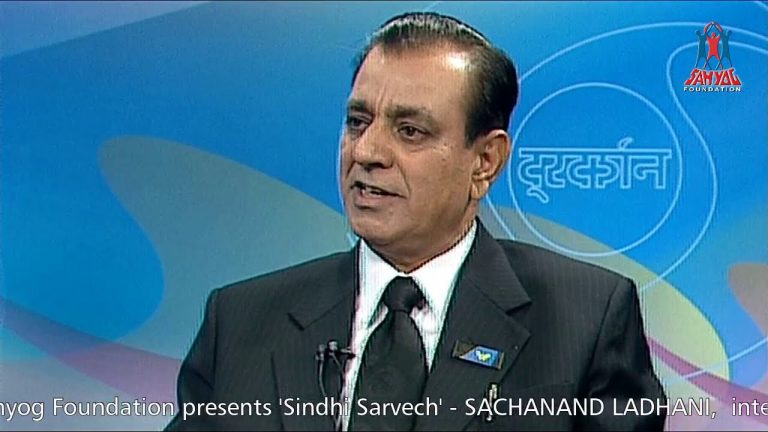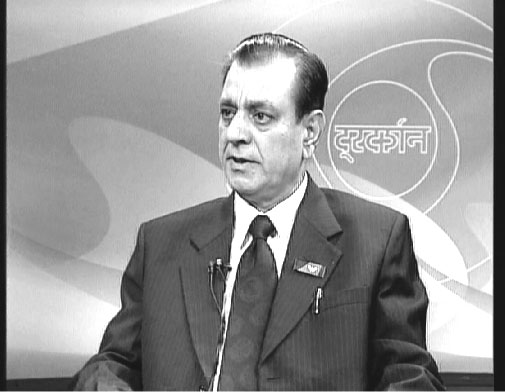
Sachanand Ladhani, who had started from a meager salary of Rs.60 a month in 1960, currently is the Director of about a dozen companies.
“I can still recollect that day, when captain Gopinath came to me with a proposal to start a helicopter taxi service. I thought that the prospective customers must have their own helicopters. I asked him whether his proposal would be viable and how would he ensure its success? The captain replied that the people coming from overseas want to see India and our rail/road travel is time consuming and tiring. He had firm belief that the project would prove to be a profitable one,” Sachanand had said in an interview in 2006.
“When we both met our bankers for financial support, specifically the Chairman, Bank of India, his reaction was skeptical. He thought that many airlines have gone bust the world over and why hadn’t any established airline thought about such a concept. I replied, that I had full confidence in my project as I was investing every single rupee of mine earned over the last forty odd years of hard work into it,” he told.
“I had started from a meager salary of Rs.60 a month in 1960 and reached upto the present level. When I can sink every penny of my earnings into it, they should also have confidence in our projections,” Ladhani said adding, “They demanded my personal guarantee, as I had a lot of goodwill among my bankers. I said, they should not ask for my personal guarantee, as I had already committed it for other two people. An aviation project needs a lot of money.”
“The government didn’t help us. When we constructed a hangar for helicopters and approached the Karnataka Finance Corporation for financial assistance, they simply laughed at our proposal. We had to pitch in with every single paisa from our own pockets,” he said on a question.
“Our initial three years of helicopter taxi service were very trying, but our continued hard-work and perseverance paid us rich dividends. We contacted large business houses and convinced them that having their own helicopters cost them 300% more than using our taxi services. For a personal helicopter, they had to shell out pilots’ salaries, ground rentals and maintenance charges. At last they agreed, and our project got their full support. Political parties utilized our services for campaigns etc. Our helicopters were also used for rescue operations, for providing urgent medical care to heart patients and many other commercial uses. Our project not only earned a good name, but improved our bottom-line, too.”
Sachanand Ladhani didn’t know Capt. Gopinath earlier. “No! We didn’t know each other before that. When he thought of helicopter taxi services and contacted banks, they simply refused to help him. Then someone referred him to me, as I am always ready to take risks. God has always been kind to me and I have never failed in any of my ventures,” he said.
The name of his village was ‘Ghulam’, which was situated near the town of Rohri, Sachanand said recalling those days. “Whenever I asked about my dad, I was told that he was in Bombay”.
Even in those days, Sindhi businessmen had regular interaction with Bombay, he said. “Baba (father) was sixteen years old, when Sukkur Barrage was built on Indus River. At that time, Baba had taken his mother to ‘Char Dham’ for pilgrimage. It took him three years to have a pilgrimage of all the four pilgrim centers (Char Dham).”
“We came to a village of Shanker Garh, situated near Allahabad. Some relatives from our paternal side had already come there and we had followed them”.
According to Sachanand his father was employed with a construction firm, which used to work for the Indian Military.
“I cannot recollect any hardships of migration through which my family might have gone through. I can only remember few glimpses of our rail journey from Sindh,” he told.
Sachanand completed his nursery (Kinder Garten) in Sindh and then upto IV Std. he studied in Shanker Garh. Then, they shifted to Faizabad which is the birth place of Lord Rama. “There, I completed my matriculation. I learnt Sindhi at Faizabad and presently I can read and write Sindhi language to some extent.”
“We speak Sindhi in our homes but my children are not educated through the Sindhi medium. This may have been the reason behind their disinterest towards learning Sindhi language. My children have started learning Kanada since we shifted to Bangalore. My wife speaks in Sindhi with her children. She narrates stories in Sindhi and then asks them to answer few questions. It is just to make certain that children understand Sindhi language very well. This can only be done by the elders, else the children will lose every interest in their mother tongue and slowly and gradually Sindhi will make its exit from our homes,” he said.
The rest of his family lives in Ayodhya. “Our family in Faizabad is still a joint family. All the assets are jointly owned by all of us – four brothers. I am proud of my family’s unity. It has helped us immensely. They have got different businesses. They are mainly engaged in bottling plants for Coca-Cola and Thums-Up. We were the first to bottle Coca-Cola when it was re-launched in 1993, though there were many established players already there. It is a great brand, worldwide.”
 Sachanand told, “My father used to recall Sindh with moist eyes, but he couldn’t go back because at that time the relations between both the countries were not cordial enough. Recently, Sai Chanduram offered me to visit Sindh, but I didn’t want to go there alone. I wanted to see it along with my whole family. At last I got a chance to go there and the experience I had is simply difficult to describe in words. I have seen nearly half of the world but the love I got from Sindh was tremendous. One thing I liked most about it was that I could hear everyone conversing in Sindhi. Everyone showered immense love on all of us. I think the secret of it lies in the water of River Indus and the soil of that country. The patience and love exhibited by us Sindhis must have come from that water and soil.”
Sachanand told, “My father used to recall Sindh with moist eyes, but he couldn’t go back because at that time the relations between both the countries were not cordial enough. Recently, Sai Chanduram offered me to visit Sindh, but I didn’t want to go there alone. I wanted to see it along with my whole family. At last I got a chance to go there and the experience I had is simply difficult to describe in words. I have seen nearly half of the world but the love I got from Sindh was tremendous. One thing I liked most about it was that I could hear everyone conversing in Sindhi. Everyone showered immense love on all of us. I think the secret of it lies in the water of River Indus and the soil of that country. The patience and love exhibited by us Sindhis must have come from that water and soil.”
“I am highly optimistic that good relations between both the countries would help our mother-tongue, because the majority of Sindhi speaking people live on other side of the border. We could not resurrect our language in India due to the fact of us being scattered throughout India. Our collaboration with Pakistani Sindhis would certainly benefit our language.”
Watch the interview of Sachanand Ladhani
He said, “Sindhi songs and Kafis, when sung, create a celestial atmosphere. It looks like the singer sings from his heart.”
“A few artists had come from Sindh and we were in the forefront to receive them. We hold Cheti-chand festival at Faizabad, every year. My younger brother Mohan Ladhani is completely dedicated to Sindhi society. Whenever he is called for community work, he is there to do it,” he said to a query.
When asked, he said, “My generation would love to go back but our descendants won’t like the idea. I long for love which only Sindh can provide me but our younger generation won’t appreciate it.”
“People here love out of compulsion or you can term it as need-based love, while in Sindh people love from their hearts. Real love can only be provided by the soil of Sindh.”
Shri L. K. Advani had conferred an award on Sachanand from the platform of All India Sindhi Chamber of Commerce at Ahmedabad. “I have received many awards, but this award has a special place in my heart because it was given to me by my community. I feel proud to have received it. It is as good as receiving blessings from my elders. It inspires me to do more for my community. I am thankful to our Ahmedabad federation.”
To achieve the No. 2 position in domestic skies, in such a short span of time is a remarkable feat, perhaps unparalleled anywhere in the world. As per the figures released by the Directorate General of Civil Aviation (DGCA) for June 2006 the Bangalore based Air Deccan’s share had grown to 21.2%. The Air Deccan operated 265 flights daily to 55 destination (largest served by a domestic carrier).
Sachanand currently is the Director of over a dozen companies. Registered in Karnataka, the 13 companies are: Deccan Aviation Turbine Overhaul Private Limited , Manish Promoters Private Limited , V3 Hospitality Private Limited , V N Plastics Private Limited , Brindavan Beverages Private Limited , Brindavan Phosphates Private Limited , Tuff Drilling Private Limited , Queencity Developers Private Limited , Brindavan Packaids Private Limited , Brindavan Enpro India Private Limited , I Assure Info Solutions Private Limited , Bonanza Investments Limited and Brindavan Health Care Limited. He is former Director at Kingfisher Airlines Ltd.
____________________
Courtesy: Sindhishaan Magazine (July-Sept. 2006 Issue) The interview was conducted in Sindhi. Interviewed by Ram Jawhrani for Sahyog Foundation. Translation into English by Prem Matlani.